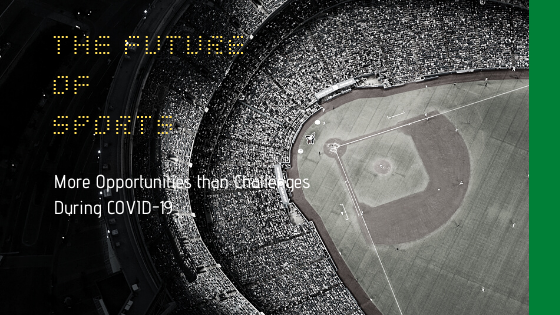Sports is the biggest unifying factor in our growth as a socially-well rounded race. ESPN is hosting a SportsCenter Special to discuss COVID-19‘s impact on the lives of athletes and how they cope with it.
Things will take time to get back to normal, even as the COVID-19 induced economic slowdown continues. Almost every business activity has been pushed to “working from home”, and in these challenging times, we are witnessing a host of innovations in the broadcasting industry. ESPN Inc., currently owned by ABC, Inc., an indirect subsidiary of The Walt Disney Company and Hearst, has been leading with sports broadcasting during the COVID-19 pandemic. Today, ESPN would host the SportsCentral Special show, at 9 PM EST. The theme is “The Return of Sports” hosted by Get Up’s Mike Greenberg.
The medium: Video Conferencing and Broadcasting.
Today, in the latest edition of ESPN’s SportsCenter Special, sporting fans would see and hear their champions speak on how they are fighting the lows and blows from the COVID-19 pandemic, and what resumption of sports might look like in the coming weeks, if not days.
The Return to Sports special edition on ESPN would feature prominent voices from the sporting fraternity, including MLB manager, Joe Madden, NFL superstar Calais Campbell (Pro Football Hall of Fame), NBA’s Damian Lillard, Women NBA’s Brianna Turner, NHL’s Patrick Kane, NWSL’s Crystal Dunn, and MLS star Alejandro Bedoya.
The show is expected to also feature conversations with Gary Bettman (NHL), Cathy Engelbert (WNBA), Don Garber (MLS), Roger Goodell (NFL), Rob Manfred (MLB) and Adam Silver (NBA).
ESPN.com would broadcast the show to discuss the return to normalcy in the competitive American sporting arena in the middle of the pandemic.
ESPN SportsCenter debuted in 1979, and since then it has established itself as ESPN’s flagship show that defines the sports news genre. Currently, viewership averages up to 115 million viewers a month. In April 2018, ESPN+ was launched with access to thousands of live events, original programs and on-demand content.
Pandemic, Hygiene, Security and Social Justice Reforms
Calling for social justice and equality within the sporting teams across all college, state and national level teams and institutions, each speaker would share his/her experience and approach to “return to sports”. The voices are only growing for return of sports to normal itinerary despite economic impact and plans hitting the bottom line of ticket sales in the stadiums. However, video gaming and online gaming with live streaming broadcast would likely replace physical journeys to the stadium to watch your favorite teams and players play at the center of court or field.
Without fans and cheerleaders, going forward, the NBA, NHL, MLS, NFL and other sporting organizations are expected to leverage the potential broadcasting innovations to live on beyond the COVI-19 wreckage.
Playing and Watching Sports in the COVID-19 World
Global sporting activities remain one of the biggest contributors to the development of economic, physical and aesthetic needs of our times. With health, sanitation and social distancing norms that are currently in place due to the COVID-19, sports may never return to the normalcy that we witnessed in January 2020 and before. We can safely say– the pre-pandemic sporting standards are all set to be lost and buried forever.
According to the United Nations’ Department of Economic and Social Affairs Social Inclusion, all major sporting events have either been canceled or postponed until later half of 2021, including the Tokyo Olympics and Paralympics. In 2018, sports industry was estimated to be valued at $470 Billion (source: World Economic Forum).
Today, it’s more than $756 billion USD. For such as fast-growing industry (at least in the pre-March 2019 timeline) which employs millions of peoples directly and indirectly involved in sports (player, managers, Commissioners, travel and hospitality, ticket sales, event managers, broadcasters, advertisers, retail merchandise and training schools), the COVID-19 pandemic has forced everyone to stay indoors.
Playing Without Live Audiences
The rise of revenues from the TV and Live streaming platforms are the reasons why sporting leagues are considering playing without fans and audiences in the stadium. Moving venues to areas least affected by COVID-19 are also considered, something which was done previously by MLBs in the midst of hurricanes in the US.
However, the unprecedented nature of the pandemic halting movement of man and material poses a string of unbelievable challenges to continue with sports as is, especially when training and conditioning are also out of way.
According to the WEF, COVID-19 will give an opportunity to the sporting industry to lead in the analogous entertainment business with D2C subscription-based content. MLB is already offering free-to-air broadcasting on MLB.TV and YouTube. So, there is a lot to think and act on these channels as well.
Biggest Challenge: Possible Decline in Attendance and Engagement
In the post-COVID-19, once the lockdown lifts and we re-assess the damages done to cash flow, insurance and advertising revenues, we would certainly see a dip in fan attendance and engagement rates. The sports ecosystem needs to quickly analyze how they intend to bring back players to “work”, rethink sports experience as a service, and strategically invest in diversifying their portfolios across all leagues and regions.
We would see new models of engagement such as eSports and venue management experience to come to life with inclusion of Live, AR VR and 3D gaming-based content distribution.
Let’s see how the science unfolds in sports and partnership community.
(To share your stories with us, please write to sghosh@martechseries.com)












Comments are closed.